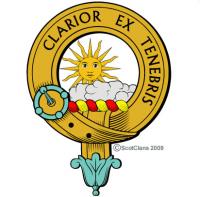
Clan Purves
The surname Purves comes from the word 'parveys', meaning the church portico or porch of St. Paul's, where the lawyers would meet for consultation.
In Berwickshire, a family who had been long settled there, gave name to Purvesburgh, and were the vassals to the Earls of March.
At sometime between 1214 and 1249, a grant was made to the monks of Melrose by Sir Archibald of Douglas and William Purveys of Mospennoc.
In 1296, by signing the Ragman Roll, William Porveys of Peebleshire and William Pourays of Berwickshire, along with a number of other Scots nobles, pledged their allegiance to Edward I, King of England. Porveys's seal bears a snake tied in a knot and S' Willi' Purvais. Later on the same year, he reappears, this time as William Puruys, witnessing a charter by William de Billingham in regards to the lands at Fleurs, near Coldingham in Berwickshire.
A confirmation charter by Patrick, Earl of March, was witnessed by Alan Purvays of Ercildon in 1318.
In 1408, William Purwase was a juror on an inquest at Swinton, and in 1427, Thomas Purvas had a charter de impignoracione terrarum de Swynwode' from Robert Stewart, 1st Duke of Albany.
An inquest concerning the lands of Tulloch in 1438 saw Andrew Purwas as a juror.
In 1474, Jok Purwas, or Purvas, was a man to 'pitch the pavilions,' and Rob and Wil were yeomen of the stables.
A claim to the third part of Cranshaws was witnessed by Patrick Purwes in 1453, and in 1485, Andrew Purves was rector of Kynel.
Very few notices of the Purves of that Ilk family are found in the public records because they were never a leading family politically or fincially. However, there was a rhyme in connection with the family printed, and it reads like a parody relating to the Haigs of Bemersyde:
"Befa', befa', whate'er befa',
There'll aye be a gowk in Purves-ha."







